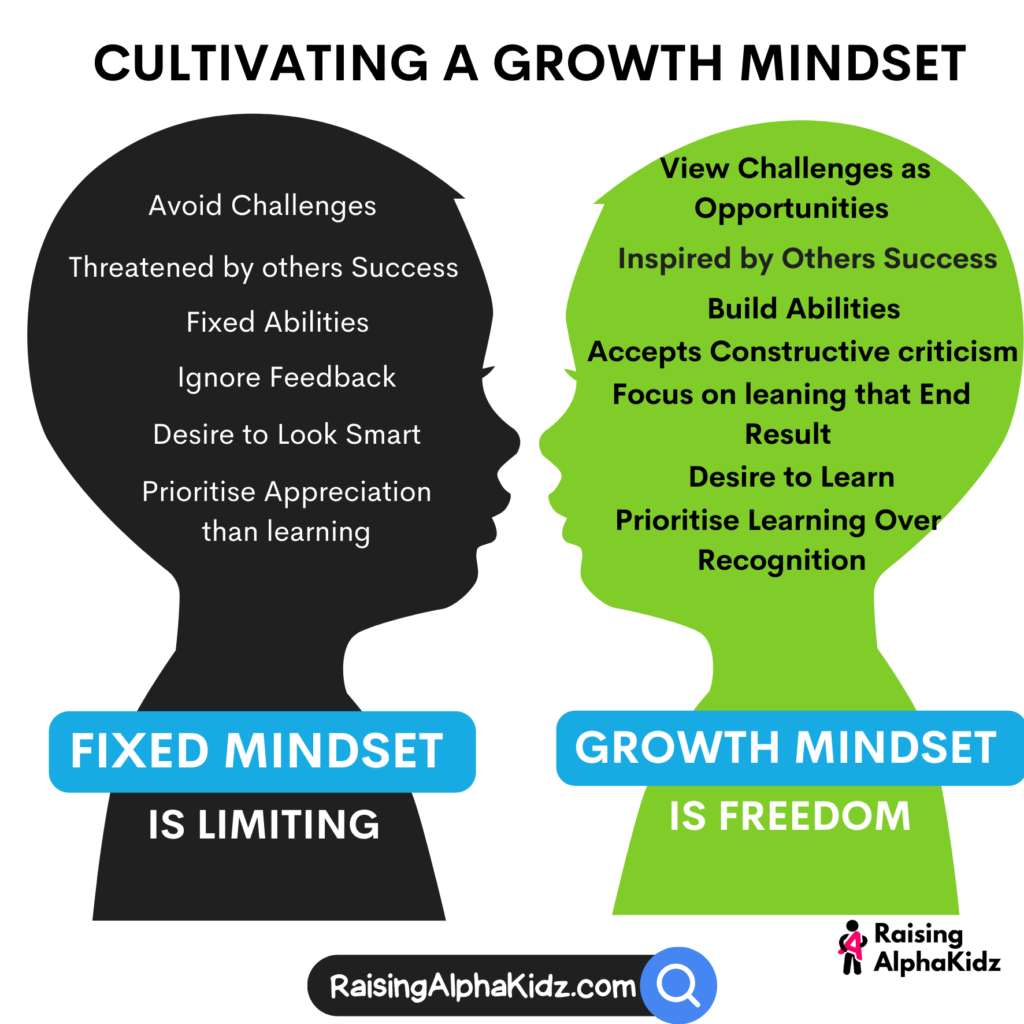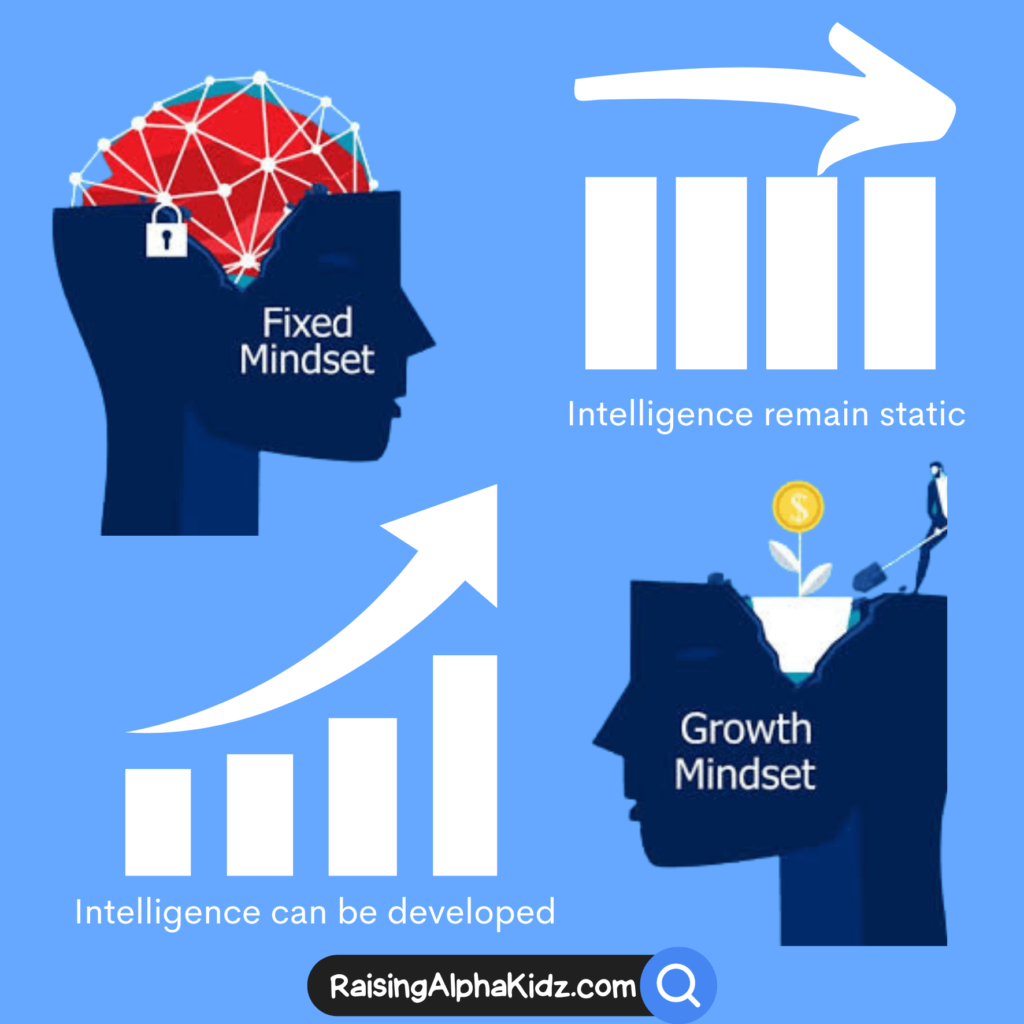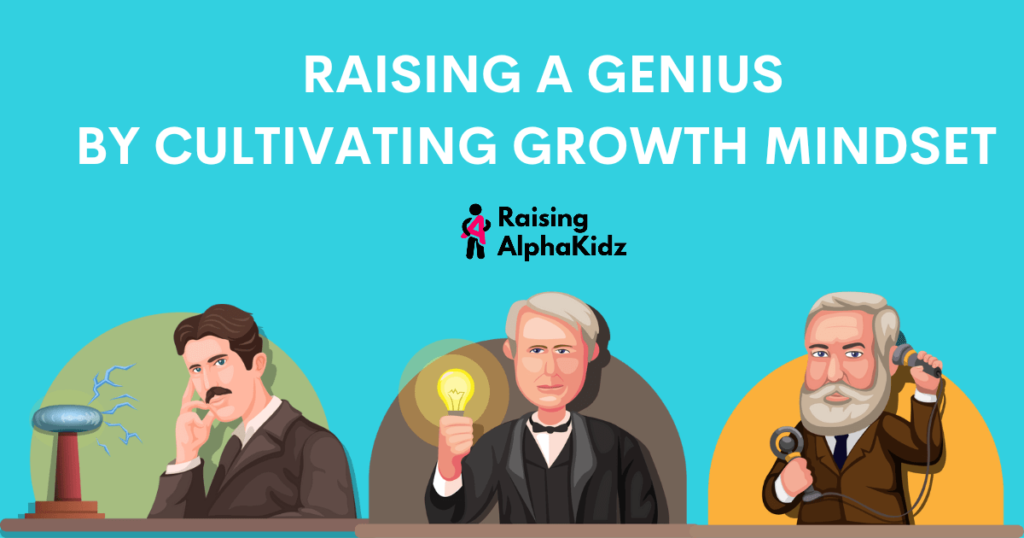Every parent tries their hardest to maximise their children’s potential in the fast-paced world of today. Yet the real question here is: Are all the parents succeeding 100% of the time? Absolutely not. Then, do you guess where everything goes wrong? Undoubtedly, something prevented the transformation of their ideas and efforts into practise. Which is that? Guess it, do you? It is a mindset. Yes! Unknowingly, we act in ways that give our kids some sort of fixed mindsets that put hurdles in our attempts of raising a genius kids. If kids adopt a fixed mindset, no amount of work or activity will produce long-term, high-value results. Hence, let’s focus on encouraging a growth mindset in place of fixed mindset first before combining all of our parenting efforts, enrolling kids in the finest schools, and providing the greatest learning activities and approaches. So that nothing you do is ever in vain. We will discuss the significance of encouraging a growth mindset in children in this post, as well as offer helpful advice and techniques you may employ to help the to raise a Genius by cultivating growth mindset.
Mindset: Does It Really Matters?
As we seen earlier, there are two mindset ideologies Growth Mindset and Fixed Mindset. You might think, it’s too exaggerated ideology to believe raising a Genius solely depends on simply cultivating some sort of mindset in children. But, the ideology is put forward by the popular psychologist Carol Dweck. Do you want to know more about his research related to mindset, then continue reading.

Growth Mindset: Genius Not Born! Just Cultivated!
A growth mindset is the idea that one’s skills and intellect can be increased through commitment, learning, practising and putting efforts on things rather than being born prodigy. Whereas, fixed mindset refers to believing that intellectuals are born with innate talents. This belief emphasis on the concept that just because intellectuals who do it with little or no training, can’t be done or beaten with training.
Sowing Mindset : Spot the Weeds Within Us
Do you know where this mentality difference initially appeared in children? Most often, it is passed on to our kids by us. Adults have developed the habit of having a fixed mindset by believing that geniuses are born with natural abilities and that human traits are all carved in heads. You will adopt this attitude as a result of certain inaccurate assumptions and preconceptions, and you will begin to fix what you can and cannot based on your prior experiences. We also validate our ideologies with scientific data, such as genes, skull phrenology, craniology, etc. This forces you to organize your triumphs in one area and stay as clever and prosperous as possible while avoiding failures at all costs. Trying new things, Struggles, failures, and Challenges will get automatically out of the scene. Thus, you got successfully trapped in Fixed Mindset.
It’s All Parenting Faults!
Most kids were not initially born with a fixed mindset. Infact, they make superior role models for developing a growth mindset while growing up. Right from their birth, children used to practise new abilities. Not just a ordinary abilities, but also life’s most challenging skills, like learning to walk and talk. Never do they decide it’s too hard or not worth the effort. Also they aren’t concerned about making mistakes or looking foolish. They stroll, trip, fall and then get back up. They simply charge ahead. What may put a stop to this enthusiastic learning of growth mindset suddenly. Do you guess it? It’s all parents! Most of the time, it’s us who put them into the fixed mindset by unintentionally teaching the kids, an entrenched worldview.
Did You Know?
Fixed Mindset was first noticed and elucidated by Alfred Biner, an inventor of IQ tests. Also, he illustrated new educational programs in his Book “Modern Ideas About Children” to get fixed Mindset children back on track.
Praising Them Down: Wrong Ways of Applause
When we become stuck in the fixed mindset of thinking that our talents are innate, we start looking for our children in it. When children excel others in a simple task, we don’t think twice about labelling them as gifted in that specialized subject. We give them praise for their gift and lead them to believe that they were born with it out. Unknowingly, we fail to recognise the effort and hardship that goes into the background. Do you know what kind of series effects it has in child? That is the foundational stage in guiding your children towards a fixed mindset.
Each time you compliment a child’s skill, do you say anything like,
- “You paint beautifully; you could be talented like Picasso,”
- “You’re scoring 9 out of 10, and you did that without studying”? I love that! You are good at Maths!
- You are a Skillful Basketball player, just like your dad! You run our family genes!
Praise of talents would just make them more focused on it, wouldn’t it? That would be a message to them that their performance is what we value and, worse yet, that we can infer their true, innate talent from it. The fixed attitude is being taught to children, isn’t it? How can children believe in efforts, practice and training if they believe that they have such innate potential? Does it install the courage to take the risk? No! In order to encourage children’s confidence and success, more than 80% of parents agreed that it was important to compliment kids’ talents. That really does make sense, you know.
The Fixed Mindset is being installed in children as a result of excessive praise for inborn abilities.
You Didn’t Mean It, But it Gets into Nerves!
Inadvertently believing that you are recognising the children’s talents, we used to praise them in this way. The following mentality in children is prevented by this pathetic admiration.
- I have skills in math or art that I should show off to gain more recognition.
- Children believe that their level of skill or intellect in a specific field (maths/painting) is fixed, and it is thus preferable to demonstrate a good portion of them.
- If they suffer a minor setback in the area, they will feel rejected, unhappy, and down on themselves.
- Believe that because of their natural skill, they don’t need to train or put in a lot of effort to succeed.
- They progressively cease doing activities for the sake of learning new things, but instead acquire a strong need to repeatedly demonstrate their superiority.
- Will get consumed with the need to prove themselves in the classroom, which consumes them.
- Gradually look for confirmation about their character, intellect, or personality in every circumstance.
Getting Trapped: Success or Fail
Will I succeed or fail? is how they assess the scenario.
What will others think of me?
Can I get appreciation or rejection?
Will I be winner or loser?
Their expectations must be met for the situation to improve; otherwise, it becomes worse.
Eye Opener!
Never believed it? To make the effects clear, let’s use a example.
Do you have any thoughts as to why some students were so concentrated with proving their skills while others were let go and learn? Ability has two definitions, a fixed ability and a changeable ability. Have a look at this illustration to better grasp of both abilities.
The mindset of small kids.
Let’s assign a child the task of completing the same jigsaw puzzle one more time. If a child has a fixed mindset, he will never ask any questions and will keep attempting to solve the same task in hopes of proving his success.
If the children have a growth mindset, they will never redo the same puzzle. They will inquire as to why I must proceed with the same puzzle and demand increasingly difficult challenges. If they had a more active mind, they may say, “I love the challenges of figuring out the puzzle. I need more and more harder puzzles to solve !” So, children with a fixed mindset try to ensure their success. They believe intelligent people ought to always prosper. Success, however, is about challenging oneself, according to children with a growth mindset. That has to do with learning more.
Which would you pick, if you had to? Many possibilities for success and praise or many challenges? Just, analyse your Mindset!

The mindset of older kids
Assume that your child get a C in math even though they often received higher grades.
Fixed Mindset
They have been raised with a fixed mindset that thinks they are born with a gift for math. If this situation occurs, they will immediately sense the anxiety of having their value diminished. They could feel worthless because you have confined their natural ability. As a result, they acquire poor self-esteem, become card-carrying pessimists, and lack the mental fortitude to deal with defeat. Their day is as follows Do nothing, branding it a bad day, Sleep, cry, eat chocolate, and, if I get the chance, yell at someone, listen to music, Spend some alone time, engage in conflict, or simply feel depressed!
That suggests that they are preoccupied with protecting their reputation rather than trying to figure out what went wrong.
Growth Mindset
Changeable Ability exerts in children with a growth mindset, who haven’t set any boundaries and limits for the area of their talent. They will see a C grade in maths as one of the areas that need some improvisation. They are motivated to work a lot harder in class, they think they have the rest of the other exams to pull up their grade. However, we can’t say they don’t feel distressed. Of course, they do, but still, they were ready to take the risks, confront the challenges, and keep working at them. Thus, they turn a failure into a gift of learning further. As they haven’t been introduced to the idea “If at first, you don’t succeed, you probably don’t have the ability.”, they no longer doubt their ability. They are eager to understand what went wrong and are willing to expand their knowledge by learning from mistakes, giving learning more importance than reputation which is trait of genius (raise) with growth mindset.
Thus, the passion for stretching oneself and sticking to it, even when it’s not going well, is the hallmark of the growth mindset. This is the mindset that allows children to thrive during some of the most challenging times in their lives, making them a genius with growth mindset.
Born Prodigies Vs Raising Genius
In the meanwhile, you can’t totally ignore the kids who are born with natural skill whom we call Born Prodigy. Also, Every child, of course, has a distinct genetic make-up and skill set, so they are born with varied temperaments and aptitudes. But, when it comes to trying to better ourselves, only our genes and environment work together. For genes to function correctly, the environment must provide input in the form of knowledge, practise, and individual effort. By acknowledging innate abilities, we are unable to claim that a person’s intellect is a fixed trait and to hold the view that it cannot be improved. It is what we would describe as a fixed mindset, and we must reject this bleak, negative viewpoint. We may manage to improve our abilities, attention span, and memory with a growth mindset, practise, training, and interest. Hence, if we want to improve our intelligence, we must nurture the growth mindset to raise a genius.
Cultivate Growth Mindset, Raise a Genius !


I want to express my appreciation for the writer of this blog post. It’s clear they put a lot of effort and thought into their work, and it shows. From the informative content to the engaging writing style, I thoroughly enjoyed reading it.
It’s clear that you truly care about your readers and want to make a positive impact on their lives Thank you for all that you do
I appreciate the effort that goes into creating high-quality content, and this post was no exception. The insights and information were top-notch and made for a really engaging read. Keep up the great work!
I admire how this blog promotes kindness and compassion towards ourselves and others We could all use a little more of that in our lives
Your photography and visuals are always so stunning They really add to the overall quality of the content
Every time I read one of your posts, I come away with something new and interesting to think about. Thanks for consistently putting out such great content!
Your words have the power to change lives and I am grateful for the positive impact you have had on mine Thank you
Your posts are like a breath of fresh air I appreciate how you tackle difficult topics with grace and empathy
I always look forward to reading your posts, they never fail to brighten my day and educate me in some way Thank you!
Your posts are always so relatable and relevant to my life It’s like you know exactly what I need to hear at the right time
This blog is a great mix of informative and entertaining content It keeps me engaged and interested from start to finish
I completely agree with your perspective on this topic It’s refreshing to see someone presenting a balanced and thoughtful viewpoint
Your positivity and enthusiasm are infectious It’s clear that you are truly passionate about what you do and it’s inspiring to see
Your posts always make me feel like I’m not alone in my struggles and insecurities Thank you for sharing your own experiences and making me feel understood
Looking forward to your next post. Keep up the good work!
Your blog stands out in a sea of generic and formulaic content Your unique voice and perspective are what keep me coming back for more
Your blog is like a breath of fresh air in a sea of negativity and pessimism Thank you for being a source of light and hope
It’s always a joy to stumble upon content that genuinely makes an impact and leaves you feeling inspired. Keep up the great work!
Wow, I had never thought about it in that way before You have really opened my eyes to a new perspective Keep up the great work!
This blog post is packed with great content!
This is exactly what I needed to read today Your words have given me a new perspective and renewed hope Thank you
Looking forward to your next post. Keep up the good work!
Your blog post was really enjoyable to read, and I appreciate the effort you put into creating such great content. Keep up the great work!
I’ve come across many blogs, but this one truly stands out in terms of quality and authenticity Keep up the amazing work!
Your blog post had me hooked from the very beginning!
Love this appreciation for great content
Wow, I had never thought about it in that way before You have really opened my eyes to a new perspective Keep up the great work!